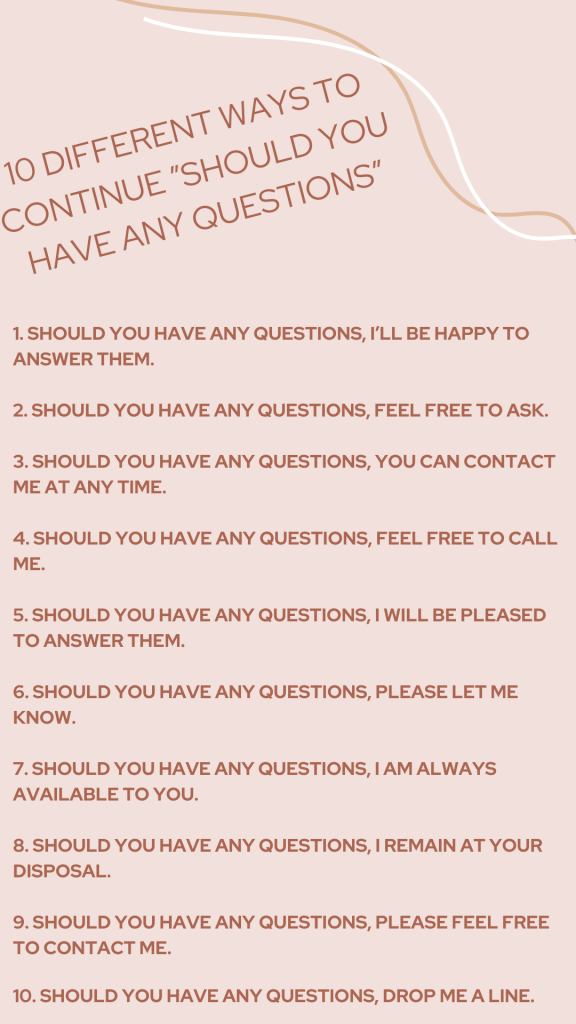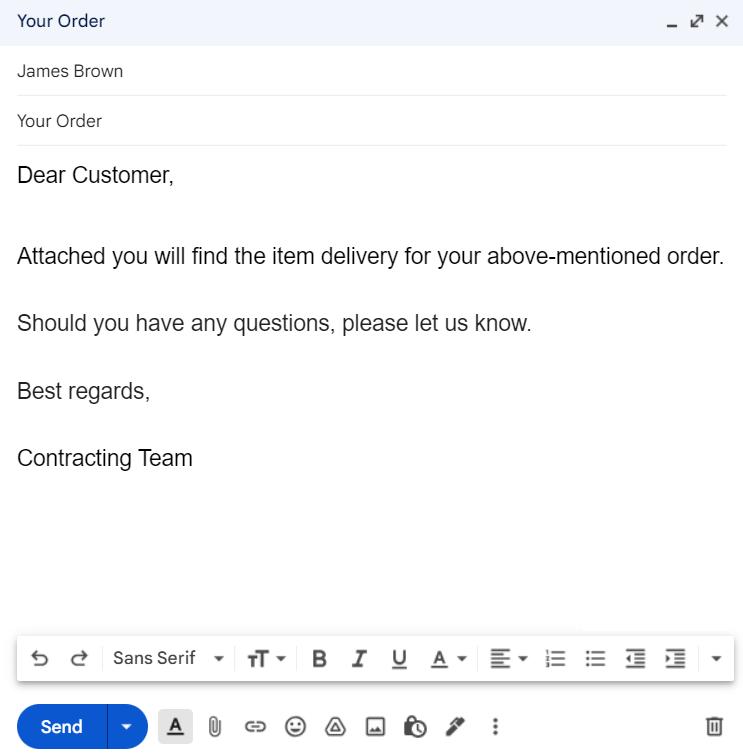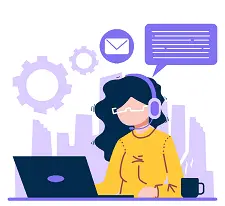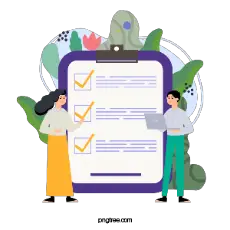What is the Meaning of the Phrase ”Should You Have Any Questions”?
The phrase ”Should you have any questions” is used when a person wants to provide more information that was not given. For example, when you are writing an email and providing specific information but think that the other party might need more details, you can use this phrase. It is also commonly used to let the other person know they can contact them anytime.
10 Ways to Continue ”Should You Have Any Questions”
1. Should you have any questions, I’ll be happy to answer them.
This phrase implies that the person using it has a willingness and availability to answer questions if they arise.
2. Should you have any questions, feel free to ask.
If you are requesting clarification or asking the person, who wrote the email, to provide more information and they include this phrase in it then it means that they are giving you a chance to ask them any question related to what they wrote in the email and if you have any.
3. Should you have any questions, you can contact me at any time.
The phrase “you can contact me at any time” means that you can contact the speaker for any questions at any time.
4. Should you have any questions, feel free to call me.
This is a common phrase that is often written at the end of emails to signal that the sender will answer any questions from the email.
The meaning of ‘should’ in this context can be interpreted as ‘it would be good if you do.’
5. Should you have any questions, I will be pleased to answer them.
This phrase is used in letters, emails, and other such forms of writing to provide assurance that the sender will be happy to answer any queries that the reader may have.
It’s a phrase that can be used for an introduction or at the end of an email or letter, which is formal and polite.
6. Should you have any questions, please let me know.
The simple explanation is If you ever have any questions about anything, please feel free to contact me.
7. Should you have any questions, I am always available to you.
The phrase means that you should have any questions and if you do, feel free to ask them.
8. Should you have any questions, I remain at your disposal.
The phrase “if you have any questions, I am at your disposal” is used in an informal context as it sounds more natural.
9. Should you have any questions, please feel free to contact me.
One of the most used phrases. It means that the speaker is giving the listener a chance to ask questions.
10. Should you have any questions, drop me a line.
This is a common phrase that people often used in the office. It is usually used when you want to leave your co-worker and colleagues with a message. Just the phrase “drop me a line” means “drop me a line of text” or “send me an email.”

Sample Emails
EXAMPLE 1
Dear Customer,
Hope you are doing well.
We would like to inform you that the subscription of your license is going to expire on 06/01/2023.
May we kindly ask you to confirm, if you would like to receive a quotation for the upcoming renewal?
We thank you in advance for your feedback by answering this e-mail. If you would like to get the optional price for a multiyear renewal, please let us know.
Should you have any questions, please feel free to contact us!
Kind Regards,
Global Renewals Team
EXAMPLE 2
Dear James,
I’ve raised this case with the support team, we’re waiting for their response. I will update you soon.
Should you have any questions, you can contact me at any time!
Sincerely,
Jessica
EXAMPLE 3
Hello Peter and team,
Thank you very much for the discussion last week.
We had to do additional discussion internally.
This is to confirm that we will proceed as described during the call last week.
Should you have any questions, I remain at your disposal!
Best regards,
George
EXAMPLE 4
Hello Susann,
I would like to take this opportunity to introduce myself and thank you for your business with (COMPANY NAME). As your Project Manager, I will be your primary point of contact for the services that we will be providing to you.
Should you have any questions, I’ll be happy to answer them!
Kind regards,
Maria
Conclusion
This expression usually comes at the end of an explanation as a way of providing assurance that if one has any further questions, they can ask these questions now. Just remember that when writing on behalf of your company or department to use the plural of the personal pronoun ”I”. In the example below we have used ”please let us know” instead of ”please let me know” because we are speaking on behalf of the Contracting Team.










